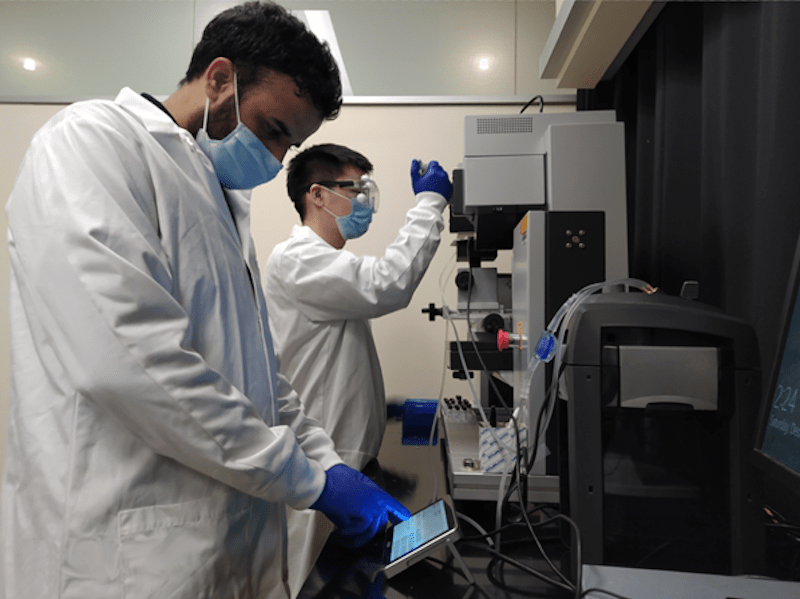Channels
Special Offers & Promotions
Liquid Crystal Sensor offers breakthrough for rapid COVID-19 diagnostic test
Linkam Scientific’s PE120 Peltier system formed part of the experimental set-up used to develop a radical new diagnostic test for the SARS CoV-2 virus at Ohio State University (OSU), Columbus, Ohio, USA.
The global outbreak of COVID-19 has prompted scientists to focus their research on rapid and robust diagnostic tests. Reverse-transcription polymerase chain reaction (RT-PCR) assays – the ‘gold-standard’ for molecular clinical diagnostics – became available quickly, however this provides relatively long characterisation times and the need for specialised equipment.
Researchers at OSU have subsequently designed a liquid crystal (LC) based diagnostic kit and a smartphone-based application to enable automatic detection of SARS-CoV-2 ssRNA, which could be used for reliable self-test of SARS-CoV-2 at home without the need for complex equipment or procedures.
Prof Xiaoguang (William) Wang, PhD led the research team at OSU, and commented on his decision to consider LCs as a prospective diagnostic technology to meet the need: “It is well known that thermotropic LCs are ultrasensitive to small chemical modulations, and we felt that we could use this property to develop a rapid LC-based detection method for SARS CoV-2 virus that could be contained in a portable and economical sensor.”
A series of experiments were required to prove this concept and develop a prototype sensor, which included three key steps.
- The characterisation of a substrate layer that had been ‘functionalised’ with a liquid crystal mixture.
- Validation of the reliable binding of an ssDNA ‘probe’ to this layer.
- The detection and quantitation of ssRNAcov extracted from the virus as it bound to the probe.
Important for this last step was holding the temperature of the system at precisely 48.7°C, the melting temperature of ssRNA. The Linkam PE120 stage was integral to this phase and gave the team at OSU the reproducible control of the temperature of the sensor they needed during the process.
The PE120 Peltier system is straightforward to integrate with microscopes and other equipment, and ensures precise control of the temperature of microscope slides to +/-0.1°C at temperatures between ?25°C to 120°C.
Prof Wang’s research has recently been published, and it has shown that LC-based sensors offer a highly sensitive, reproducible and robust method of detection of target ssRNAcov – with detection limits in the nanomolar to femtomolar range.
Commenting on the work, Robert Gurney PhD, Marketing and Applications Specialist at Linkam Scientific, said: “What Prof Wang and his colleagues have achieved is extremely exciting. It’s great that one of the Linkam temperature control stages has played a key part in the team’s proof-of-concept studies, and I’m looking forward to seeing the results of the next stage – trials of the sensor with patient samples.”
Learn more about PE120 Peltier system
About Professor Xiaoguang (William) Wang
Xiaoguang (William) Wang, PhD was recently appointed Assistant Professor in the William G. Lowrie Department of Chemical and Biomolecular Engineering, College of Engineering at the Ohio State University (OSU), USA – exploring his recent ground-breaking work in the field of SARS-CoV2.
Prof. Wang was awarded his first-class honours and master’s degrees in chemical engineering in China, before moving to the University of Wisconsin-Madison, USA, in 2016 to complete a PhD with Prof. Nicholas Abbott. His research there focused on liquid crystal-templated assembly of colloids and molecules.
Prior to joining OSU, Prof. Wang worked with Prof. Joanna Aizenberg at Harvard University as a postdoctoral fellow, researching the design of functional materials based on stimuli-responsive soft matter.
The William G. Lowrie Department of Chemical and Biomolecular Engineering at OSU has around 23 tenure-tracked faculty members working on diverse research fields including bioengineering, polymers, catalysis, sustainability, energy, fluid mechanics and molecular simulation.
About Linkam Scientific Instruments
Linkam offer market leading solutions in hot stage and freeze-drying microscopy, optical DSC, and thermodynamic sample characterisation. We develop and manufacture a broad range of temperature and environmental control stages that help you to characterise materials including pharmaceutical compounds, polymer composites, biological tissue, fibres, nanomaterials, minerals, and metals. Add thermal sample control from high (1500°C) to cryo temperatures. There are also options for humidity, vacuum, and pressure control as well gas purging and electrical connections.
Linkam stages are used with light microscopes and a wide range of analytical techniques including Raman, FTIR, WAX/SAX and many more to visualise and characterise the properties of materials. Each of our instruments are designed and manufactured in house by our team of highly experienced electrical, software and mechanical design engineers. Alongside our standard range we offer customised solutions, where we work very closely with the researcher to design, prototype, and manufacture a bespoke system.
more news from Linkam Scientific Instruments
Media Partners



